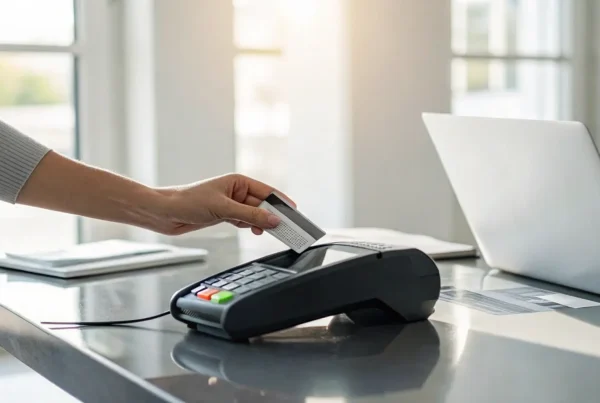Whether a business deals in small or large transactions, choosing the right merchant credit card processor will make all the difference. Choosing the best credit card processor for the needs of your business can help ensure your customers’ payments are handled as quickly and securely as possible. However, knowing exactly where to start can be the real problem, considering the numerous credit card processing options. You need to know what questions to ask credit card processing companies to avoid being charged with hidden fees, poor service, or security issues.
According to a report, “There are 8,332 businesses in the Credit Card Processing & Money Transferring in the US industry in the United States, which has grown at a CAGR of 4.9 % between 2019 and 2024” (IBISWorld). Therefore, it’s important to choose the right partner for your business. As one of the top credit card processors in the US, we have created this guide that includes the most important questions you can ask a prospective merchant payment processor. Let’s dive into questions that find the perfect fit for your business. But first!
What is a Merchant Credit Card Processor?
A merchant credit card processor is a company that allows businesses to accept credit and debit card payments, among other electronic payment methods such as mobile wallets. This is quite an important service for the industry, offering an easy way of collecting money from customers who prefer using cards instead of cash. Merchant processors ensure that the money exchange between the financial institution of the buyer and seller goes through adroitly. They ensure the transaction goes through successfully without any threat or delays in the authorization, billing, and settlement procedures.
In today’s world, a credible credit card processor is necessary for almost every large or small-scale business. A credit card processor can be a conventional bank, a third-party service provider, or any company specializing in merchant services. They provide the essential apparatus to safely receive and handle these payments, be that in the form of POS machines, websites, applications, or mobile wallets. This almost always involves some form of transaction fee, including fees for equipment, and a merchant contractural agreement.
Key Questions to Ask Merchant Credit Card Processors
When evaluating potential merchant credit card processors, asking the right questions is essential to ensure the service aligns with your business needs. Here are the ten most critical questions you should ask:
1. What Fees Are Associated With Your Service, and Are There Any Hidden Costs?
Understanding the full cost of using a merchant credit card processor is crucial. Furthermore, you need to know about these expensive setup fees, monthly maintenance fees, transaction fees, and what upsells could apply. You also need to find out if there are any hidden costs that might come up during your service term. Chargebacks, cancellations, and even account maintenance can cost, and some processors will add fees for those.
Be sure to inquire about all the merchant payment processors’ fees upfront to ensure there are no surprises down the road. It’s really important for small businesses to keep track of their expenses. The best credit card payment processor for small businesses, such as MBNCARD, Inc., will be transparent about costs and not impose unnecessary fees.
2. Are You Suitable for Small Businesses or Large Transactions?
Not all credit card processors for small businesses are equipped to handle high-volume transactions, and vice versa. Suppose your business must process a lot of money or run in an industry with changing transaction volumes. In that case, you’ll need a processor that can handle those peaks without disrupting your service or softening the deadlines for processing these transactions.
Asking whether the processor is the best credit card processor for large transactions will help determine if it can scale with your business needs. Whatever your level of operation, it’s important that your chosen processor can grow with you. A processor that can handle small and large transaction volumes gives you flexibility and ensures you won’t have to switch processors later.
3. Which Credit Cards and Payment Methods Do You Support?
Ensure that the credit card processor you choose supports multiple payment methods, such as credit and debit cards, mobile wallets like Apple Pay and Google Pay, and even newer payment methods like cryptocurrency if relevant to your business.
The more payment options a merchant credit card processor can accept, the easier it will be for your customers to complete transactions. This will improve the customer experience plus can augment sales. Moreover, different payment methods may carry varying processing fees depending on how they are paid.
4. How Does Your System Handle Security and Fraud Prevention?
Security is one of the biggest concerns when we think about credit card processing. Fraud prevention should be solid, with encryption, tokenization, and secure payment gateways as preferred options. Also, they need to find out if they ensure PCI-compliant security (Payment Card Industry Data Security Standard). This complies with the industry’s highest security standards to protect customer data.
Ensure your processor knows how they handle fraud and offer features to back that up, such as chargeback protection. A goodmerchant credit card processor should offer ongoing monitoring for suspicious activity and provide alerts in case of potential fraud.
5. What Is Your Contract Term, and What Are the Penalties for Early Termination?

When you sign up with a merchant payment processor, you want to know how long the contract is and if there are any cancellation fees. The problem with many credit card processing companies is that they require a long-term commitment, which could become problematic if you decide to switch providers or grow beyond the service’s capabilities.
Check the contract length, renewal terms, and any penalties or fees for terminating it early. The more flexible the contract, the better. This question is most important for businesses seeking to avoid a long-term commitment. Additionally, it’s helpful to see whether the processor has a month-to-month agreement so you can continue to pay at your contract rate if your business changes.
6. What Customer Support Services Do You Offer?
The best customer support can certainly help make or break your experience if you’re faced with a technical problem, for instance, or when you need a helping hand with account management. See if they have customer support available, in what ways (phone, email, live chat, etc.), and how long it takes them to respond.
The more support you have, the less downtime you’ll have. Choose a processor that proactively and reactively cares for you.
7. How Do You Handle Chargebacks and Disputes?
Credit card processing chargebacks are a real pain point for merchants and can be very costly. You’ll want to know how your payment partner handles chargebacks and disputes, including the process for contesting them and any associated fees.
This means that the best processors provide chargeback management systems and dispute resolution tools for processing. Find a processor that will support you through the process and can help you quickly resolve these disputes. You just need a service like this to reduce financial losses and allow your business to resolve the issues with minimum effort.
8. Can You Integrate with My Existing Business Systems?
Your credit card processor should integrate seamlessly with your existing point-of-sale (POS) system, accounting software, or e-commerce platform. Then, see if the processor integrates with the stores you are using, like Shopify, WooCommerce, or QuickBooks. Doing so will save you time and help you manage your business operations seamlessly.
We at MBNCARD, Inc. we support a range of customizable integration options to facilitate effortless integration with existing software and minimize businesses’ learning curve and setup time.
9. What Other Tools or Analytics Are Supplied with Your Services?
Many merchant payment processors offer additional features beyond basic payment processing. They may include reporting tools, analytics dashboards, inventory management, and customer relationship management (CRM).
If you’re running an online store or interested in how customers spend, ensure your processor has useful reporting tools. These tools can help you manage your business more efficiently. In addition, these tools can assist you in making data-driven decisions that will increase overall profitability.
10. How Fast Do You Process and What Are Your Uptime Guarantees?

Reliability is key when choosing a credit card processor. Find out how long they say they will be up and how long it typically takes to process requests. Outages and slow processing times can hurt your customer experience and even cost you sales. Quick processing is also key to customer satisfaction and preventing sales loss caused by technical issues.
At MBNCARD, our completely reliable processing power, above-average uptime, and lightning-fast transaction speeds guarantee that you will never have to fear bad sales or operations due to poor uptime.
Conclusion
The right choice of the merchant credit card processor may mean the difference between success or failure in your business. Use these credit card processing questions to get the best service you need, whether you operate a small business or manage larger transactions. Take some time and weigh your options carefully to go with a full-service merchant payment processor that matches the needs of your business.
As one of the best merchant credit card processors, we understand that each business is unique. Be it questions about security, pricing, or customer support, most will guide you to the most reliable and least costly solutions. Contact us today!




